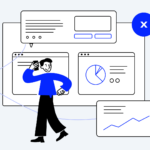WhatsApp For Sales: How to Sell Efficiently in 2025 – CloudTalk
60% of WhatsApp users interact with businesses weekly, and messages sent through the app enjoy a 98% open rate*, making it one of the most effective communication tools available today.
As traditional marketing channels become crowded, WhatsApp offers a direct, personal approach that resonates with consumers.
Plus, with over 2 billion active users globally, it has evolved beyond a simple messaging app into a robust platform for businesses to engage customers, nurture leads, and close deals.
Are you ready to unlock the potential of WhatsApp to elevate your sales strategy in 2024? Let’s explore how to sell efficiently on this dynamic platform and turn conversations into conversions.
Key takeaways:
- WhatsApp boasts a 98% open rate, outperforming email marketing
- 68% of users say WhatsApp is the easiest way to connect with businesses
- WhatsApp Business API allows for seamless integration with CRM systems
- Personalized messaging on WhatsApp can increase conversion rates by up to 40%
Try 14 days for free and then enjoy 50% off your first month!
Why Use WhatsApp for Sales?
While cold calling is still a feasible go-to sales strategy, today’s customers prefer instant, personalized communication – and that’s where WhatsApp shines.
WhatsApp is not just for sharing memes and family photos anymore. For savvy sales teams, it’s become the digital equivalent of a master key, unlocking doors to prospects that were previously deadbolted shut.
- Global dominance: 180+ countries, 2 billion+ users (That’s like 6x the US population)
- Unparalleled engagement: Better open and engagement rates than email marketing (Email marketers, eat your hearts out)
- Multimedia playground: Share images, videos, and documents (Because sometimes, a picture really is worth a thousand words)
- Mobile friendly: Free app, low-cost API integration (Your CFO will do cartwheels)
- Secure messaging: End-to-end encryption for all messages (Privacy advocates, rejoice!)
WhatsApp’s business-friendly features make it a no-brainer for sales teams. From broadcast messages to automated responses, it’s a Swiss Army knife for modern sellers.
How to Use WhatsApp for Sales?
Meet Helena, a sales manager. She’s been struggling with low email open rates and missed calls for a couple of months. Then, she discovered she could use WhatsApp for sales.
Here’s how she transformed her team’s approach:
As her business grew, Helena needed a more robust solution. Enter the WhatsApp API –a powerful tool designed for scaling businesses. This API allows for seamless integration with existing customer relationship management (CRM) systems and other business tools.
The WhatsApp Business API enabled Sarah’s team to:
- Automate responses to common inquiries
- Manage high message volumes efficiently
- Integrate WhatsApp communications with their CRM
- Allow multiple team members to use the same WhatsApp number
With CloudTalk’s WhatsApp integration, Sarah’s team now manages all customer interactions in one centralized platform. This integration eliminates the need to switch between apps, reducing the risk of missed messages and improving response times.
Build a WhatsApp Sales Funnel
Helena redesigned the sales funnel with WhatsApp at its core. She created a journey that guides prospects from curiosity to conversion, all within the familiar WhatsApp interface.
Example: When a lead expresses interest, Helena’s team sends a friendly inbound WhatsApp message with a product demo video. They answer questions in real-time and even offer a limited-time discount, all in one seamless conversation.
Leverage WhatsApp Business API
As TechPro grew, Helena needed a more robust solution. Enter the WhatsApp Business API. This API allows for seamless integration with existing customer relationship management (CRM) systems and other business tools.
The WhatsApp Business API enabled Sarah’s team to:
- Automate responses to common inquiries
- Manage high message volumes efficiently
- Integrate WhatsApp communications with their CRM
- Allow multiple team members to use the same WhatsApp number
Example: With CloudTalk’s WhatsApp integration, Sarah’s team now manages all customer interactions in one place. Gone are the days of switching between apps or missing crucial messages. It’s like having a virtual assistant that never sleeps.
Try CloudTalk’s conversation intelligence
Create a WhatsApp Sales Machine
Helena knew that to scale, she needed automation. She turned her business’ WhatsApp presence into a lean, mean, selling machine by implementing several key features:
- WhatsApp Chatbot: Helena set up AI-powered chatbots to handle the initial customer interaction, qualifying leads before human intervention.
- Message templates: The team uses WhatsApp bulk message features and prepare a library of pre-approved message templates for common scenarios, ensuring consistent communication.
- Broadcast lists: For product launches or promotions, Helena uses broadcast lists to reach multiple customers simultaneously while maintaining a personal touch.
- Automated workflows: Helena set up triggers to automate follow-ups based on customer actions or inaction.
Example: When a customer purchases something, they automatically receive an outbound WhatsApp message with their order confirmation, a personalized setup guide, and a schedule for check-in messages. It’s like having a personal concierge for every customer interaction.
Claim Your 50% Discount Now!
Generate Leads Through WhatsApp
Helena didn’t stop at just managing existing leads. She turned WhatsApp into a lead-generation powerhouse by implementing several strategies:
- QR Codes: Helena added WhatsApp QR codes to print materials and in-store displays, allowing customers to instantly connect.
- Click-to-Chat Links: The company website and email signatures now include WhatsApp chat links, reducing friction in customer communication.
- WhatsApp Ads: Helena experimented with click-to-WhatsApp ads on Facebook and Instagram, driving direct conversations with potential customers.
- Lead Magnets: The team offered valuable content (e.g., e-books, webinars) via WhatsApp, capturing leads in a more interactive way than traditional forms.
Example: Helena added a “Chat with an Expert” WhatsApp button to their website. Interested visitors can now instantly connect with a sales rep. It’s like having a 24/7 open house for their product.
Nurture Leads With Personalized Messaging
Once the leads started flowing in, Helena knew the key was personalization. She used WhatsApp to keep her business top-of-mind with tailored content. Here’s how:
- Segmentation: Sarah’s team segmented their WhatsApp contacts based on industry, interests, and stage in the sales funnel.
- Customized Content: They created different content streams for each segment, ensuring relevance.
- Behavioral Triggers: The team set up automated messages triggered by specific customer actions or milestones.
- Interactive Content: Sarah’s team used WhatsApp’s rich media capabilities to send infographics, short videos, and interactive polls, increasing engagement.
- Exclusive Offers: They sent personalized, time-sensitive offers to hot leads, creating a sense of urgency.
Example: Based on a prospect’s segment, She sends weekly WhatsApp updates showcasing relevant projects. It’s like having a personal tech advisor in your pocket.
Best Practices for Presenting Yourself on WhatsApp
To make the most of WhatsApp for sales, follow these best practices:
Craft a Compelling Business Profile
Your WhatsApp business profile is your digital business card or digital storefront. Use a professional profile picture, write a concise but informative description, and include key information like business hours and website links.
Example: “CloudTalk | Business Phone System | Mon-Fri 9-5 EST | www.cloudtalk.io“
Master The Art of WhatsApp Etiquette
Remember, WhatsApp is a personal space for many users. Be respectful, avoid spamming, and always provide value in your communications.
Example: “Hi [Name], hope you’re having a great week! I noticed you purchased [Product]. Would you like to schedule a quick call to discuss how our solution can help your business?”
Use Rich Media to Engage Prospects
WhatsApp supports various media types. Use this to your advantage by sharing product demos, customer testimonials, and how-to guides.
Example: Send a short video showcasing your product in action, followed by a text message explaining key features.
Leverage WhatsApp Status Updates
Use WhatsApp status updates to share time-sensitive offers, company news, or industry insights. It’s a subtle way to stay top-of-mind with your contacts.
Example: “Flash sale: 20% off all plans today only! Message us for details.”
Implement a Follow-up Strategy
Don’t let leads go cold. Use WhatsApp to send timely follow-ups after calls or meetings.
Example: “Thanks for your time today, [Name]. As promised, here’s the case study we discussed. Let me know if you have any questions!”
What Are The Downsides of Using WhatsApp for Sales?
While WhatsApp can be a game-changer for sales teams, it’s not all sunshine and roses. Let’s pull back the curtain on some challenges you might face:
- Privacy: The Double-Edged Sword WhatsApp’s personal nature is both its strength and weakness. Some users guard their WhatsApp accounts like a dragon guards its hoard, viewing business messages as an invasion of privacy. It’s a delicate balance between being accessible and being intrusive.
- Limited analytics: Compared to email marketing’s data buffet, WhatsApp’s analytics are more like a light snack. You might feel like you’re flying blind without the detailed metrics you’re used to.
- Message Limits: The WhatsApp Business API isn’t an all-you-can-message buffet. There are strict limits to prevent spam, which can feel like hitting a brick wall when you’re on a roll.
- Learning Curve: Switching to WhatsApp sales is like learning to drive stick after years of automatic. It takes time, patience, and a few stalled engines along the way.
- Data Security: While WhatsApp boasts end-to-end encryption, integrating it with other business systems can open up new security considerations.
- Staying professional: Using WhatsApp for sales requires a delicate balance between being personable and maintaining professionalism. It’s easy to slip into overly casual communication.
Companies Engage With Customers On WhatsApp Can Expect a 20% Increase In Business*
In a world of 5G and same-day deliveries, customers expect fast answers. By leveraging real-time messaging, you’re not just meeting expectations –you’re exceeding them.
WhatsApp lets you slide into your customers’ DMs with the finesse of a close friend but with the reach of a global brand. Just like having a heart-to-heart with thousands of people simultaneously.
So, while your competitors are still figuring out how to increase their email open rates by a measly 2%, you could be looking at a 20% boost in your entire business.
Don’t let another day go by watching your competitors slide into your customers’ WhatsApp DMs. Take the leap. Try CloudTalk free for 14 days and see for yourself how effortless dominating WhatsApp sales can be. Your future self (and your bottom line) will thank you.
Source:
Boost sales with WhatsApp and CloudTalk—AI calling for SMB growth.
Start today and turn leads into loyal customers!
FAQs
What is WhatsApp for sales?
WhatsApp for sales is the strategic use of the WhatsApp messaging platform to engage prospects, nurture leads, and close deals. It leverages WhatsApp’s high user engagement and rich features for business communication.
It how are businesses using WhatsApp for sales?
Businesses use WhatsApp for lead generation, customer support, product demonstrations, order updates, and personalized marketing messages. It’s also used for internal sales team communication and collaboration.
What is WhatsApp API?
WhatsApp Business API is an advanced solution for medium to large businesses. It allows for seamless integration with existing business systems, enabling automated messaging, a WhatsApp chatbot, and CRM integration.
What are the Benefits of the WhatsApp Business API?
Key benefits include scalable customer communication, integration with business tools, automated responses, and the ability to have multiple team members manage the same WhatsApp number.
What is the WhatsApp sales app?
The WhatsApp sales app typically refers to the WhatsApp Business app, which offers features like business profiles, catalogs, and quick replies to support sales activities.
How do I announce sales on WhatsApp?
You can announce sales on WhatsApp through broadcast messages to opted-in customers, status updates, or personalized messages. Always ensure you have permission to send promotional content.
Is there a WhatsApp for business?
Yes, WhatsApp offers two business solutions: the free WhatsApp Business app for small businesses and the WhatsApp Business API for larger enterprises.
























